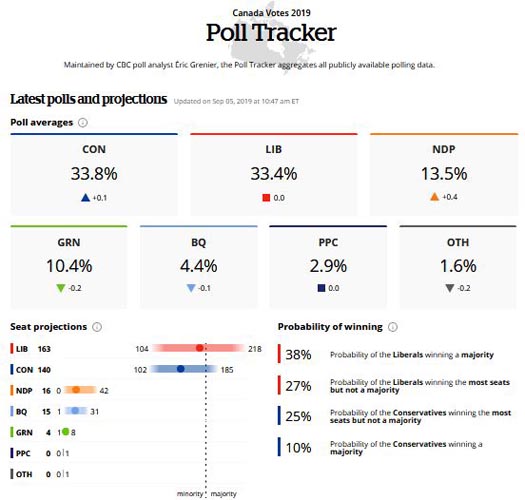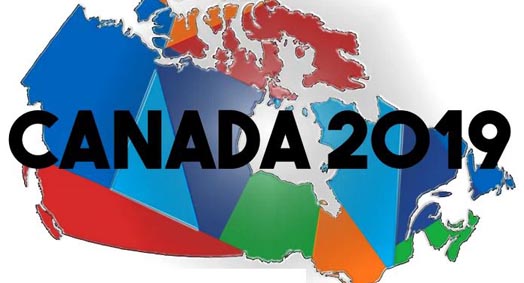
At some point over the course of the next nine days, Prime Minister Justin Pierre James Trudeau will attend at Rideau Hall in Ottawa, the home of Canada’s 29th Governor General, the Right Honourable Julie Payette, to recommend to the Crown that a federal election be called. In 2019, under Canadian law, the election period may be no less than 36 days, which gives the Prime Minister until Sunday, September 15th to “drop the writ”.
One week, or so, from the commencement of the 43rd Canadian general election, how are the five major political parties, and their leaders, faring as Canadians head into the five week long election period?
The Conservative Party
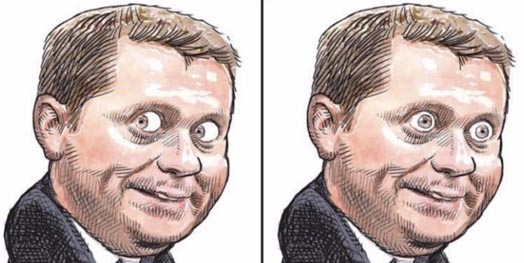
Six weeks out from the October 21st federal election, Andrew Scheer’s Conservative Party has emerged as the only Canadian federal political party to have nominated candidates in all of Canada’s provinces and territories which comprise the 338 ridings that constitute the Parliament of Canada.
The Conservative Party goes into the election with the largest fundraising total for any federal political party with $28 million in the coffers to run both the national and the riding-by-riding campaigns, outstripping their four rival Canadian political parties. If elections could be bought, Andrew Scheer would become Canada’s 24th Prime Minister.
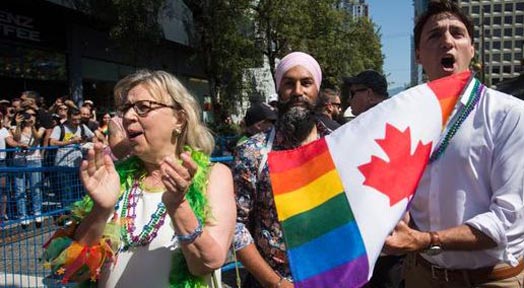 Green Party Elizabeth May, New Democratic Party leader Jagmeet Singh, and Prime Minister Justin Trudeau march together in the 2019 Vancouver Pride Parade.
Green Party Elizabeth May, New Democratic Party leader Jagmeet Singh, and Prime Minister Justin Trudeau march together in the 2019 Vancouver Pride Parade.
Sad to say for the Conservatives, though, the pre-election period has hardly been kind to either Andrew Scheer, or his struggling Conservative party. A couple of weeks back, Mr. Scheer found himself in hot water for failing to participate in any LGBTQ2+ Pride Parades across Canada — when Prime Minister Justin Trudeau, Green Party leader Elizabeth May and NDP leader Jagmeet Singh were front-and-centre walking arm and arm at the Vancouver Pride Parade — after which (in a series of challenging and ultimately failed press interviews), Mr. Scheer failed again to enunciate a position on LGBTQ2+ issues acknowledging that as Prime Minister he would represent all Canadians, not just right-of-centre Canadians.
On top of that, Conservative party leader Andrew Scheer found himself in hot water arising from the release of a 2004 Canadian Parliamentary video where he rose in the house to decry same sex marriage. And, finally, in the 14-day-old contretemps, Mr. Scheer failed to assure Canadians that he would forbid Conservative MPs from putting abortion on the political agenda in a Conservative Party led Canada — concerning, given that Conservative party members who are also “anti-abortion activists are planning to win 50 ridings for their cause in the upcoming federal election.”
This past week, in his bid to fear monger — a traditional right-of-centre political party tactic — Mr. Scheer sought to scare the bejeezus out of Canadians by suggesting the government of Justin Trudeau would allow infamous child-murderer Jon Venables’ move to Canada after being released from prison in England. Scheer’s post caused widespread controversy. To make matters worse for Andrew Scheer, the British Justice Ministry stated Britain has no intention sending Venables to Canada.
As further confirmation that Scheer’s post was categorically false, and was indeed ‘fake news,’ Immigration, Refugees and Citizenship Canada also added that some people are “inadmissible” to the country under Canada’s immigration law, particularly if they have a criminal record or could pose a risk to Canada’s security. Meaning that even if Venables was headed towards Canada, he would probably struggle to get though immigration.
The Liberal Party
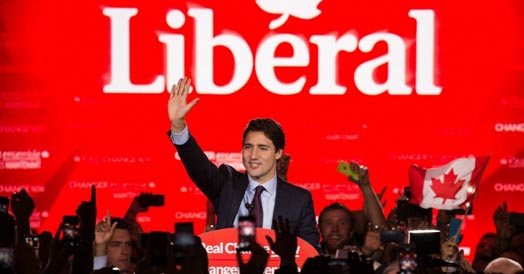
Meanwhile, the government of Prime Minister Justin Trudeau has gotten out of the way of the train wreck that has become the Conservative party 2019 bid for government, while making a record 5500 spending announcements this summer totaling $15+ billion, in ridings across Canada, ranging from transit and affordable housing to the environment and infrastructure, with the unstated caveat that all of the commitments made by his government would be cut were Andrew Scheer to become Canada’s next Prime Minister.
The New Democratic Party
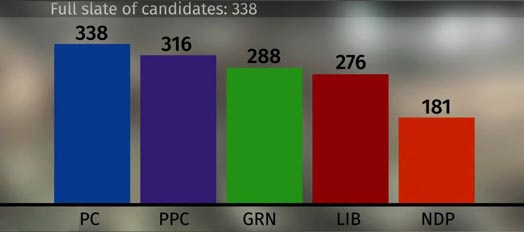
Take a look at the graphic above. As of Thursday evening, September 5th, the federal New Democratic Party has nominated candidates in only 54% of ridings across Canada, with no nominated candidates in the provinces of New Brunswick and Prince Edward Island. Furthermore, the NDP goes into the 2019 federal election with a $4.5 million debt from the 2015 election, and less than a quarter of the money raised by either the Conservative or Liberal parties with which to present their case to the Canadian people.
For the first time since the party was formed in 1961, the New Democratic Party will have no campaign plane to take the leader, and the press entourage, across the country, in order that campaigning might take place more readily in all provinces and territories across the country.
According to Éric Grenier’s CBC Canada Poll Tracker, an aggregation of all publicly available polling data, the New Democrats are at 9.4% support in the province of Québec. That places them in fifth place, behind the leading Liberals (32.8%), the Conservatives (23.5%), the Bloc Québécois (18.5%) and the Greens (11%). The very real prospect exists that the NDP may be wiped out in Québec, losing all 15 of the current seats held in the province.
(VanRamblings wouldn’t count out Ruth Ellen-Brosseau in the riding of Berthier-Maskinongé, a popular hard-working NDP member of Parliament.)
On Tuesday, New Brunswick’s Green Party announced the defection of 15 NDP candidates to the federal Green Party. Turns out, though, that eight of the so-called NDP dissidents knew nothing about their defection to the Greens, forcing federal Green Party leader Elizabeth May to backtrack, and restate the number of defections at only seven, while the other eight members of the New Brunswick NDP went on record stating they would remain loyal members of the NDP, and knew nothing about the decision to defect to the Greens. In a CBC interview, federal NDP Leader Jagmeet Singh said Green Party Leader Elizabeth May “has a lot to answer for.”
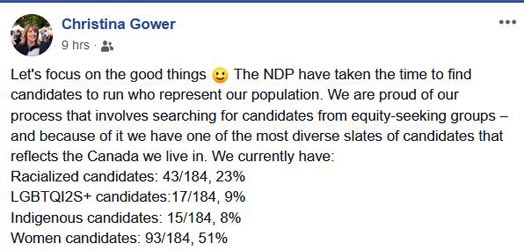
Meanwhile, British Columbia and much of southern Ontario remain NDP strongholds, with a popular John Horgan NDP government holding power in Victoria, and a strong presence with Andrea Horvath’s NDP, who elected 40 MPPs to the Ontario legislature in the 2018 provincial election.
In British Columbia, Vancouver East MP Jenny Kwan is a lock to hold onto her seat, as is the case with Don Davies in Vancouver Kingsway and Peter Julian in New Westminster-Burnaby. Jagmeet Singh, we predict, will hold on to his seat in Burnaby South. Svend Robinson looks to make a welcome comeback in Burnaby North-Seymour. Yvonne Hanson is running a first rate NDP environmental campaign in Vancouver Granville, as is the case with community activist Christina Gower in Coquitlam-Port Coquitlam — both novice candidates could very well win their respective ridings.
CBC’s At Issue panel podcast | Thursday, September 5 2019 | Upcoming election
The Green Party
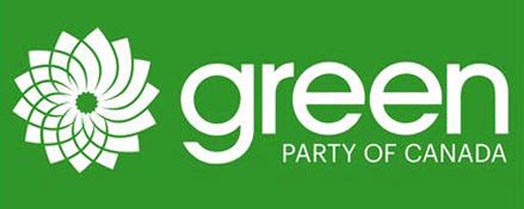
Canadians most frequently score Green Party Leader Elizabeth May as the most ethical among her federal counterparts, according to a series of Nanos Research and other surveys conducted over the past 12 months. The Greens will have nominated candidates in all federal ridings by this time next week, and according to recent polling stand a good chance of gaining official party status (12 seats) in Parliament, post the October 21st election.
In the final week of the pre-election period, according to the latest polls, the federal Green Party could elect 5 members to Parliament representing ridings on Vancouver Island, a member or two in Ontario, as well as Québec, and a sturdy contingent of Green Party MPs in the Maritimes.
The fortunes of the Greens rely on the benevolent affability of Ms. May.
Should Ms. May acquit herself well at the Canadian Museum of History in Gatineau, Québec (just across the Ottawa River from Parliament Hill) during the course of the October 7th federal leaders’ debate, she could very well consolidate support for the Green Party of Canada, and assure official status for the party in Parliament following the October 21st election.
Please find below an episode of The Herle Burly, one of the finest podcasts to come out of Canada, fascinating always, the interviews conducted and conversations led by longtime Liberal Party apparatchik David Herle. In the episode below, you’ll hear Mr. Herle’s recent, fascinating, wildly informative and revealing interview with Elizabeth May. Very much worth a listen.
People’s Party of Canada
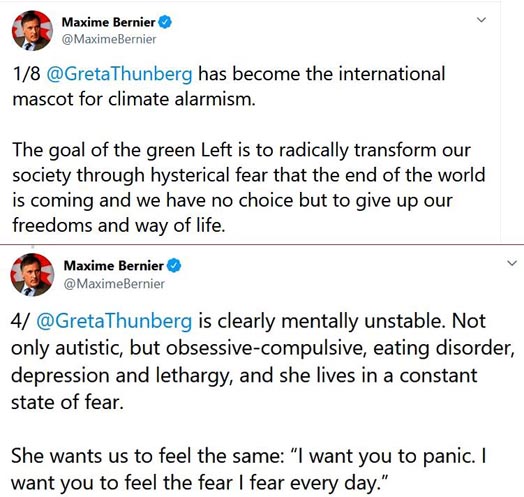
Currently polling at 2.9% across Canada, Maxime Bernier and his band of racist, transphobic and xenophobic supporters don’t have a chance in hell of electing anyone to Parliament. Mr. Bernier will not be included in the leaders’ debates. The less said about this group of reprobates the better.
![]()
![]()
![]()
